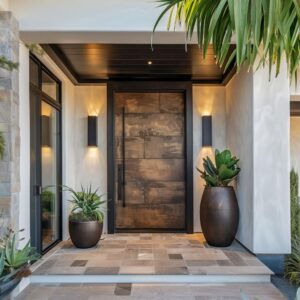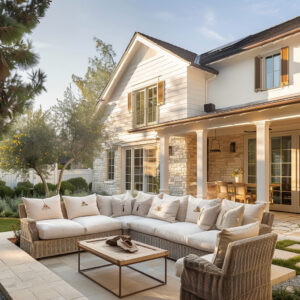With the rise of remote work, outdoor home offices have become increasingly popular. These spaces offer a unique blend of productivity and connection to nature, transforming backyards into functional work environments.
Creating a tranquil and efficient workspace at home is essential for maintaining focus and balance.
Outdoor offices come in various styles, each catering to different needs and aesthetics. Garden office pods offer a sleek and modern solution for those looking to maximize space.
These compact structures are perfect for individuals needing a small garden office setup. Alternatively, a garden shed office can be an excellent choice for those who prefer a more rustic and traditional approach, providing ample room for both work and storage.
One can also opt for a garden home office that blends seamlessly with the natural surroundings, creating a harmonious work environment. The key is to choose a style that not only complements the home’s overall design but also meets the functional requirements of the workspace.
Whether it’s the clean lines of modern design, the cozy charm of farmhouse style, or the minimalist elegance of Japandi, there’s an outdoor office solution for every preference.
Style and Aesthetic Appeal
Farmhouse Style
The farmhouse style is characterized by its rustic charm and emphasis on natural materials. This design often includes distressed wood, vintage accessories, and a cozy, welcoming atmosphere.
The simplicity and warmth of farmhouse design make it an excellent choice for an outdoor home office. The natural elements and straightforward design create a space that feels both functional and inviting, perfect for long workdays.
The farmhouse style is suitable for an outdoor office space because it blends seamlessly with garden surroundings, creating a cohesive look. The use of wood and earthy tones helps the office integrate with the landscape, providing a tranquil and inspiring environment that enhances productivity and comfort.
Modern Style
Modern design is defined by clean lines, minimalism, and the use of industrial materials such as metal and glass. Key elements of modern design include open spaces, neutral color palettes, and a focus on functionality.
This style is ideal for creating an outdoor garden office that is sleek, efficient, and clutter-free.The benefits of modern design for productivity and well-being are significant. The simplicity and orderliness of a modern outdoor office space reduce distractions, allowing for better concentration.
The use of large windows and open spaces ensures plenty of natural light, which can boost mood and energy levels, making it easier to stay focused and motivated throughout the day.
Japandi Style
Japandi style is a fusion of Japanese minimalism and Scandinavian functionality, creating a design that is both elegant and practical. This style emphasizes simplicity, natural materials, and a muted color palette, resulting in a calm and orderly space.
The blend of these two design principles makes for the best garden office that is both beautiful and efficient.
Creating a harmonious and peaceful workspace with Japandi style involves careful selection of furnishings and decor. The use of natural wood, soft textiles, and minimalist decor helps to create a balanced environment.
An outdoor garden office designed in the Japandi style offers a serene retreat that fosters focus and creativity, ideal for those who seek a tranquil yet productive workspace. This approach to design ensures that the office feels like an extension of the home, seamlessly integrating indoor and outdoor living.
Interior Furnishings and Layout
Desk and Chair
When setting up your outside office space, selecting a central workspace is crucial for maximizing productivity and comfort. The desk should be the focal point, positioned to take advantage of natural light and garden views.
For those with a large garden office, consider a spacious desk that offers ample room for a computer, paperwork, and other essentials. In a small outdoor office, a compact yet functional desk will ensure you have everything you need without overcrowding the space.
Choosing ergonomic and stylish furniture is essential for creating a comfortable work environment. An ergonomic chair with adjustable features can prevent back strain and promote good posture, while a desk with clean lines and a modern design can enhance the overall aesthetic.
For a portable garden office, select lightweight and versatile furniture that can be easily moved or reconfigured as needed.Storage solutions are key to maintaining a clutter-free environment. Incorporate shelves, drawers, and cabinets to keep office supplies organized and within reach.
This approach not only improves efficiency but also contributes to a tidy and inviting workspace.
Decorative Elements
Adding plants and greenery to your office space can significantly enhance the atmosphere, making it more inviting and pleasant. Select a variety of plants that thrive in outdoor conditions, such as succulents or ferns, and place them strategically around the workspace.
These natural elements not only improve air quality but also create a calming and refreshing ambiance.
Choosing functional and aesthetic lighting is vital for both daytime and evening use. For daytime, take advantage of natural light as much as possible.
For evening or overcast days, consider installing outdoor-rated light fixtures that provide adequate illumination without being harsh. In a small outdoor office, opt for compact and stylish lighting solutions that blend seamlessly with the décor.
Personalizing the space with minimal accessories can make the office feel more like your own. Add a few decorative items that reflect your personality and style, such as framed photos, artwork, or a unique desk organizer.
These touches can make a significant difference in creating a comfortable and motivating environment, whether you’re working in a spacious large garden office or a cozy portable garden office.
Structural Design and Materials
Framework and Pergola
A sturdy and attractive framework is essential for any outdoor home office. The structural integrity ensures safety and durability, while the aesthetic appeal enhances the overall look of the space.
Materials commonly used include wood, aluminum, and composite materials, each offering different benefits. For instance, a wooden garden office provides a natural and warm appearance, blending seamlessly with the surrounding greenery.Design variations in pergolas add to the versatility of these structures.
Open slats allow sunlight to filter through, creating a dynamic play of light and shadow, while grid patterns offer a more structured and modern look.
Integrating climbing plants and greenery into the design not only enhances the visual appeal but also contributes to a cooler, more pleasant environment. Plants such as ivy or wisteria can be trained to grow along the pergola beams, creating a lush, green canopy overhead.
This approach is particularly effective in a back yard office, where the goal is to merge the workspace with the natural surroundings.
For those opting for a garden shed home office, the framework should accommodate both functionality and style, ensuring the space is both practical and inviting. Similarly, an outdoor home office can benefit from thoughtful design choices that incorporate natural elements, making the workspace a pleasant and productive area to spend time in.
Flooring and Ground Cover
Stone Tiles and Grass
Choosing durable and complementary materials for the flooring in an outdoor office space is crucial for both aesthetics and functionality. Stone tiles are an excellent choice due to their robustness and ability to withstand the elements.
When selecting stone tiles, consider colors and textures that complement the natural surroundings and the overall design of the outdoor garden office.
Laying patterns and techniques play a significant role in the final appearance. For a cohesive look, consider a grid pattern or a more random layout to add visual interest.
The installation process should ensure that the tiles are level and securely placed to prevent any movement or unevenness over time.Combining hard surfaces like stone tiles with natural grass offers multiple benefits. The contrast between the solid, stable surface and the soft, green grass creates a balanced and inviting environment.
Grass areas provide a cooling effect and can make the outdoor office space more comfortable during warm weather. This combination also enhances the visual appeal, making the space look well-integrated with the garden.
Outdoor Rugs
Selecting the right outdoor rug can define and enhance the workspace, adding a layer of comfort and style. Rugs help delineate the office area, making it feel more like an extension of the indoor living space.
When choosing a rug for your best garden office, opt for materials that can withstand outdoor conditions, such as synthetic fibers or treated natural materials.
Material choices are essential for longevity and ease of maintenance. Synthetic rugs, like those made from polypropylene, are durable, resistant to moisture, and easy to clean.
They come in various designs and colors, allowing you to match the rug to your overall decor.Maintenance tips include regular cleaning to prevent dirt buildup and occasional washing to keep the rug looking fresh. Placing the rug in a shaded area can also prolong its life by reducing exposure to direct sunlight, which can cause fading over time.
In a cheap garden office setup, selecting a budget-friendly yet durable rug can significantly enhance the workspace without breaking the bank.
Lighting and Ambiance
Natural Light
Maximizing natural light through design is essential for creating an inviting and productive garden office summer house. Position your office to take full advantage of sunlight throughout the day.
Large windows and skylights are effective ways to allow more light into the space. The orientation of the office should consider the path of the sun, ensuring that the workspace remains bright and well-lit during working hours.
The benefits of natural light for productivity and well-being are well-documented. Exposure to natural light can improve mood, enhance focus, and reduce the need for artificial lighting, making it an energy-efficient choice.
For a small insulated garden office, incorporating plenty of natural light can also help regulate temperature, keeping the space comfortable year-round.
Artificial Lighting
Artificial lighting is essential for times when natural light is insufficient. Various types of lighting fixtures are suitable for outdoor offices, including LED strips, pendant lights, and portable lamps.
LED lighting is particularly energy-efficient and provides a bright, clear light that is ideal for work tasks.
Placement and installation tips for optimal lighting include layering different types of lights to create a well-lit environment. Overhead lighting can provide general illumination, while task lighting, such as desk lamps, can offer focused light for specific tasks.
In a mini garden office, consider using wall-mounted fixtures to save space and keep the area uncluttered.
For an affordable garden office, selecting cost-effective lighting solutions without compromising on quality is important. Solar-powered lights can be a great addition, providing illumination without increasing electricity bills.
Ensuring that lights are correctly placed and installed will enhance both functionality and the overall ambiance of your outdoor office.
Landscaping and Surrounding Features
Garden Integration
Integrating your outside home office with the surrounding garden is key to creating a cohesive and appealing environment. Selecting plants and shrubs that complement the office design enhances the visual appeal and ensures that the office blends seamlessly with its natural surroundings.
Choose a mix of evergreen and seasonal plants to maintain greenery year-round and add bursts of color during different seasons.
Creating pathways and natural transitions between the office and garden adds functionality and aesthetic appeal. Use materials such as stone, gravel, or wood to construct paths that lead to the back yard home office.
These pathways not only guide movement but also enhance the overall landscape design, making the office easily accessible while preserving the garden’s beauty.
Outdoor Seating Area
Designing a comfortable and inviting seating area adjacent to your exterior home office provides a perfect spot for breaks and informal meetings. Consider the layout and how it fits into the overall garden design.
Position the seating to take advantage of natural views and shade.
Choosing weather-resistant furniture is crucial for outdoor settings. Opt for materials like teak, metal, or synthetic wicker that can withstand various weather conditions.
Ensure the furniture is comfortable and matches the aesthetic of your garden office interior.
Enhancing the space with decorative elements such as cushions, outdoor rugs, and lighting can create a cozy and stylish atmosphere. Add planters or decorative lanterns to make the seating area more inviting and visually appealing.
These touches not only enhance comfort but also tie together the outdoor and indoor elements of your home office setup.
Construction and Sustainability
Sustainable Materials
Choosing eco-friendly materials for constructing a back garden office is essential for reducing environmental impact. Opt for sustainably sourced wood, recycled metal, and other green building materials.
These choices not only lessen the carbon footprint but also often come with long-term durability and aesthetic benefits.
The benefits of sustainable design practices extend beyond environmental impact. Using eco-friendly materials can improve the indoor air quality of your garden home office, provide better insulation, and often require less maintenance.
Additionally, sustainable construction can increase the value of your property and demonstrate a commitment to responsible living.
Energy Efficiency
Maximizing natural ventilation and light is a key aspect of designing an energy-efficient garden shed office. Position windows and openings to facilitate cross-ventilation, reducing the need for artificial cooling.
Large windows and strategically placed skylights can flood the space with daylight, minimizing the reliance on electric lighting during the day.
Integrating solar-powered lighting and other energy-efficient features further enhances the sustainability of a small garden office. Solar panels can be installed on the roof to provide a renewable energy source for lighting and electronic devices.
Using LED lights and energy-efficient appliances can significantly reduce electricity consumption, making your outdoor office not only eco-friendly but also cost-effective in the long run.
Conclusion
An outdoor home office offers numerous benefits, blending functionality with the refreshing ambiance of nature. Whether it’s a small garden home office or larger garden office pods, these spaces provide a productive retreat that enhances both work efficiency and personal well-being.
When planning your back yard shed office, it’s crucial to consider personal style and the specific needs of your work. Tailoring the design to reflect your preferences can make the space more inviting and enjoyable.
Functional elements such as ergonomic furniture, efficient lighting, and natural ventilation contribute significantly to the comfort and usability of the office.
In conclusion, an outdoor office is more than just a place to work; it’s a space that can greatly improve your productivity and overall quality of life. By thoughtfully integrating design, functionality, and your unique style, you can create an outdoor office that serves as a perfect extension of your home and a peaceful, inspiring workspace.



















































